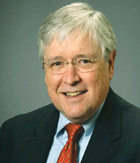
Marketplace and policy changes will place unprecedented pressure on providers to diversify and expand how they do business, according to panelists at a skilled care program in Los Angeles.
Successful providers will need to upgrade clinical abilities, care management and information technology capacities while also reducing their reliance on Medicaid funding. So predicted Kathleen M. Griffin, the national director of Post Acute and Senior Services for Health Dimensions Group. Griffin added that as accountable care organizations take hold, skilled care providers will need to further expand service offerings while also finding hospitals and health networks to partner with.
Larry Minnix, CEO of LeadingAge, insisted that many operators will need to focus on culture change that supports the best possible care delivery. He again warned that substandard facilities will not survive into the future.
Pressures for change will be exacerbated by financial woes facing most states, added Jim Carlson, president and CEO of the Oregon Health Care Association. With federal matching funds for Medicaid due to expire at the end of June, states will be under more pressure to reduce Medicaid-covered nursing home residents, he added. He noted this is happening in an environment where providers are still not sure of how far states can go to adjust the way they deliver and pay for Medicaid services under new federal healthcare reform rules.
Arnold Whitman, the CEO and co-chairman of Formation Capital, was the panel’s moderator. He said that while there are growing opportunities for skilled care operators and investors, significant challenges remain. The session was part of an event sponsored by the National Investment Center for the Seniors Housing & Care Industry. The three-day event, “The Future of the Skilled Nursing Sector: Strategies for Survival and Success in Fiscal Uncertainty,” continues through today.




